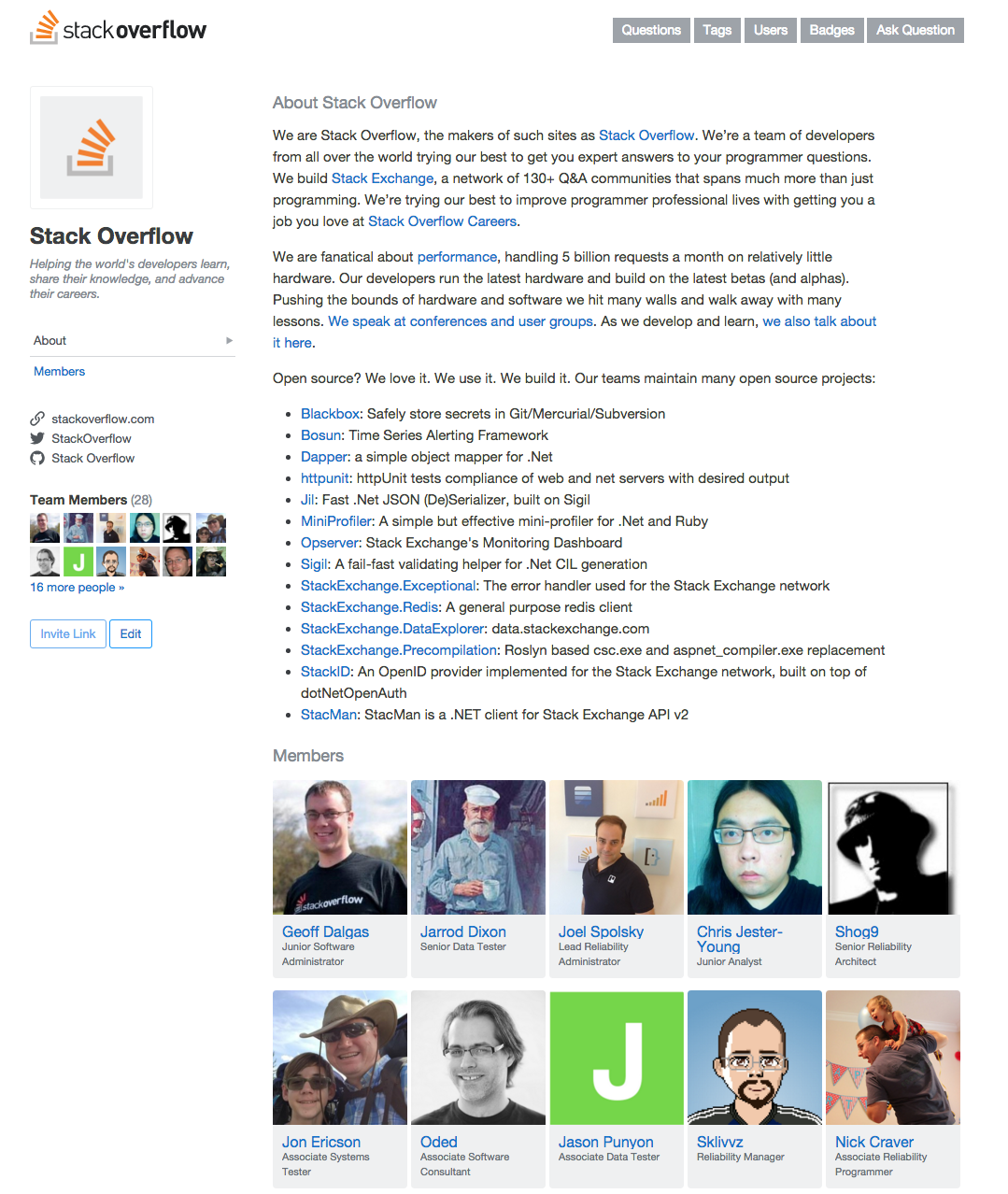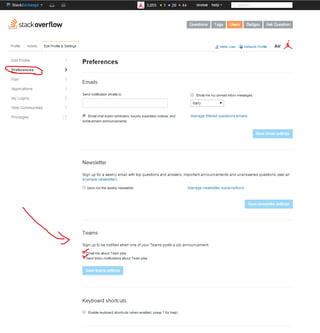A few weeks ago, we came to meta with an idea called Teams.
For those who didn’t read the first post (we can’t blame you: it was a long read!), the idea behind Teams is to give users of Stack Overflow a way to showcase their team projects and achievements on a shared page and check out what other teams are building.
We also shared longer term ideas for Teams, including Q&A, job openings, and — yes — following (more on that below).
First, we’d like to thank everyone who took the time to add answers and comments, or sign up for the private beta. Your feedback is valuable and we appreciate it. There were a number of questions and concerns, and we’d like to address those here.
What problem(s) are we trying to solve?
Teams started from an observation that one of the most common use cases for the About Me section of the user profile on Stack Overflow is to showcase your projects and achievements, which breaks down when...
… A majority of your programming work is done as a Team. Individual user profiles have trouble reflecting this (after all, your profile is about you). With Teams, we’d like to make it easier for you to show your association with others on the projects you work on.
… Your programming work isn’t mono-dimensional. You probably have a day job, but you may also contribute to one or two open-source projects, or be a member of a handful of user groups or communities. With Teams, we’d like to give you an easier way to represent your role in all these different things in a more structured way (rather than flattening all this information in your individual profile).
In their initial iteration, a Team will simply be a page on Stack Overflow where a group of developers can tell the community about who they are and showcase their best work. Just like a user profile, but for multiple people (i.e. a free form about section, links to your website, GitHub, Twitter, and a team roster).
Teams are not a new site. They’re much more modest:
Who are Teams for?
We envision Teams to be used for professional teams, open-source projects, user groups, or even programming communities endemic to Stack Overflow working towards a common goal (e.g. organizing question lists, analyzing Stack Overflow data, writing bots, etc.).
So far, it’s encouraging to see that a wide range of teams that have signed up for the private beta. We’ve had companies (some large, some small), major open-source projects, single-person OSS projects (e.g. YouCast), user groups (e.g. Git, Docker), and even Stack Overflow communities (e.g. sopython).
Of course, you might be wondering, "but why would my Team ever want to showcase its work on Stack Overflow?" In the original meta post, we heard:
My team already has a company or project website.
I’m just not interested.
In any case, that’s fine: Teams are functionally and socially optional, and you won’t need to be a member of a Team to participate on Stack Overflow (you don’t have to check out anyone else’s Team, either).
What about authenticating teams?
Regarding authenticity, it’s already a hypothetical problem on Stack Overflow (e.g. you can easily pretend to be Guido Van Rossum if you want to), but it hasn’t been a practical problem.
We realize that just like user profiles, Teams as a feature must be resilient to misinformation and trolling. In the short term, we might surface user reputation on Team pages as a solution to communicate trustworthiness. In the longer term, we’d like to explore other ways to establish trustworthiness for Teams (maybe including "verified" Teams), but it’s too early to talk about those in detail.
What about teams disparaging other Teams / offensive content / spam?
The same argument applies here as well. Users can already disparage others and post offensive content on their user profile, but this hasn’t been a major problem on Stack Overflow so far.
For the most egregious cases (i.e. offensive content), Teams will have to support some form of flagging and moderation. We still have some work to do here (and we need to ensure we don’t create more work for our moderators), so we’re not quite ready to discuss the details.
As far as the private beta is concerned, we’ll take on moderation ourselves. Moderation tools will however be an integral part of our work as we move towards public beta.
What about conflicts within teams?
Dealing with conflict is inherently a personal thing, and it’s difficult to anticipate how we’ll deal with conflicts we haven’t seen yet (and maybe they won’t even be a problem — one can always hope!).
Either way, we understand that this is probably a problem we’ll have to deal with sooner or later. We think it’s reasonable to go into private beta without a more detailed strategy (as noted above, we’ll take on moderation ourselves for now), but we’ll make sure to return to meta and discuss this before we launch into public beta.
Can you be a member of multiple teams?
Yes.
Is this for Stack Overflow only?
For the time being, yes. We’ll consider expanding Teams to other Stack Exchange communities based on how successful it is on Stack Overflow.
Is Stack Overflow becoming a social network?
No. One fear that was raised in the comments was that Teams introduces a way for users to form around non-programming interests on Stack Overflow. While these interests may apply to a wide range of developers (gaming, books, movies, etc.), that is not our intention with Teams.
Our intention is that Teams will form around programming-related groups (companies, open-source projects, or programming communities endemic to Stack Overflow). We don’t want to encourage groups which form around non-programming related topics (that’s what the broader Stack Exchange network is for!). If this becomes an issue, then we will address it.
Okay. Now as far as "following" goes, this is a mistake on our part; we jumped the gun here. Originally we thought of “following” as a feature we might introduce later on if we added Team job openings. That is, if you’re interested in a Team, then you could be notified when they post new jobs.
At some point we started thinking that "following" could be expanded to possibly other team content. To be honest, we didn’t really think it all the way through; thanks for bringing it up in the meta responses.
Following won’t exist until we have job openings on Team pages (more on that below). Once we do, following (which is probably not the best name for this feature) will only be used to be notified of new openings. We don’t have further plans around following at this time.
How is Team Q&A going to work?
Judging from the feedback we received on Team Q&A, we realize we have a lot more thinking to do (e.g. a better idea of what content is acceptable and why, a plan to ensure Teams aren’t used for spam, a strategy to address abandoned Teams).
Team Q&A wasn’t going to be a part of the beta (we hoped to ship it in Q1 next year), so we have time to revisit and perhaps rethink it (maybe with an emphasis around product and end-user support). In hindsight, we probably should have made that clearer in the initial announcement.
Team Q&A may be complex enough to deserve its own beta. We’ll return to meta when we have thought through some of the issues surrounding it. Once again, thank you for highlighting the issues we need to explore further.
Is this an attempt to integrate the Careers product with Stack Overflow?
It’s not our only goal (we think Teams can be useful for groups that aren’t going to use our Careers products, such as OSS projects), but it is indeed one of them. Here’s why:
If you’ve been around Stack Overflow for a while (even a short one), you probably noticed a few folks you admire. If they took the time to fill out their profile, you might also know what they work on, and you might even want to work with them if the opportunity arises.
On the flipside, they might be looking to hire someone like you (they might even be hiring on Stack Overflow’s Careers platform). But, you don’t know that, because developer hiring is broken, and relegates to an afterthought some of the things that matter the most in a development job: who you’ll work with, and on what projects.
Teams is thus our attempt to cut to the chase and let you start your job search with a team and its projects (which is a bit similar to how you might become interested in a job at a conference or meetup, after watching someone present their work).
In that regard, Teams are something we’re building upon the foundation of Stack Overflow Q&A. They don’t change Q&A. Teams are something new that you can decide to be a part of if you’d like, but we won’t expect you to be a member of a Team in order to participate fully in the Stack Overflow Q&A you love.
Nonetheless, we do realize that many of you are concerned that pain points in Q&A aren’t getting solved because our engineering resources are diverted towards projects like Teams. We agree, and it’s why we’re transitioning members from the Careers team to the Core team to help work on those new projects (Roberta was our first developer to transition, I did so too).
That’s all we have for now. I’m sure there will be more questions and comments. As we move into this private beta phase, we’ll learn more and have more answers for you. Once again, thank you to everyone who’s provided feedback so far. We appreciate the passion you have for Stack Overflow and its community.
You can still sign up for the private beta.
The private beta will start soon (end of October). If you would like to help us test this, please sign up at the form link below. We will need to know the following things about you:
Your Stack Overflow profile URL
Your email address
Your team name
Your team size (team size especially helps us because we will want to see how teams of varying sizes will utilize the team page).


